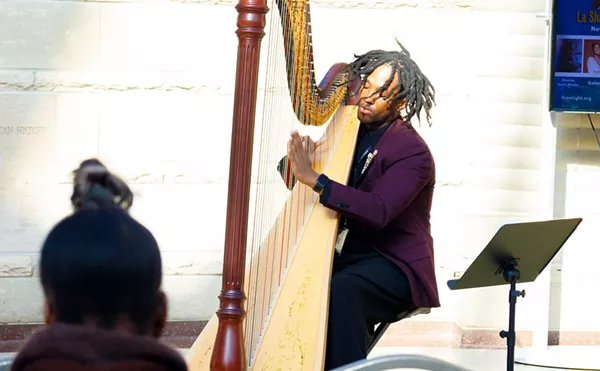
Audio By Carbonatix
[
{
"name": "GPT - Leaderboard - Inline - Content",
"component": "35519556",
"insertPoint": "5th",
"startingPoint": "3",
"requiredCountToDisplay": "3",
"maxInsertions": 100,
"adList": [
{
"adPreset": "LeaderboardInline"
}
]
}
]
Uninvited yet unavoidable, the comparison just sits there solid like a two-ton junkyard dog with a crooked grin. While Detroit has John Lee Hooker to boast on, Chicago has Muddy Waters, Howlin’ Wolf, Big Willie Dixon, Koko Taylor and a seemingly endless list of others.
It’s not the level of talent that separates Detroit from Chicago. In fact, when it comes to the music, Detroit blues and Chicago blues are nearly the same. The music of both cities is largely music made by Southern immigrants who came to the industrial North — electric country blues with a strong rhythm section. In some cases, it was the same people moving between Chicago and Detroit. Detroit pianist Will Spand partnered with Chicago guitarist Blind Blake. Big Maceo worked in Detroit for more than 15 years before moving on to Chicago. Chicago harmonica player Sonny Boy Williamson (Rice Miller) regularly worked in Detroit during the 1950s. Even now-Detroiter Willie D. Warren first worked through Chicago before moving here.
It’s the exposure and the marketing that make the difference for Chicago. There has never been a major, nationally recognized blues record label in Detroit to rival Chess Records in Chicago — or the prolific songwriting of Willie Dixon. Plus, the one major musical entertainment district that Detroit had — Paradise Valley — has been paved over. Where Detroit became known worldwide as a jazz and gospel music city, and the home of that Motown sound in the ‘60s, Chicago became known as the home of the blues Up North. Detroit blues never received the promotion it deserved.
After the demise of Hastings Street, Detroit lacked the critical mass of venues Chicago offered. “There was just as big a blues scene in Detroit as in Chicago,” recalls Johnnie Bassett. “There just wasn’t a blues club on every corner like there was in Chicago. There was a church on every corner, but not a blues club.”
Still, there is something positive to be said for the strong resurgence of the blues in the surrounding Detroit metro area. Most musicians will agree that there isn’t a shortage of gigs to be had, and there definitely isn’t a shortage of blues bands. But unlike Chicago, there is no real live music entertainment district in Detroit. And that may be all the difference. Keith A. Owens is a Detroit writer, editor and musician. E-mail letters@metrotimes.com





